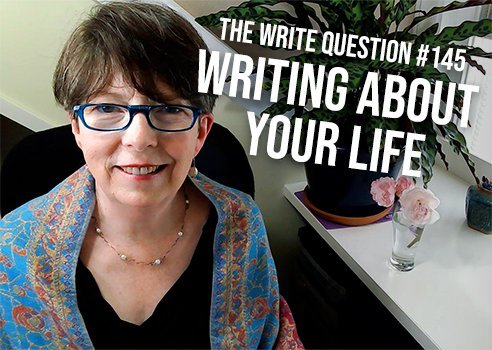Viewing time: 5 mins 5 secs
The Write Question is a weekly video podcast all about writing. Today’s question looks at how to write about your life. If you have a question you’d like me to answer you can email me, tweet me @pubcoach, or leave a message for me at the Skype account, The Write Question.
Transcript:
How to write about your life? That’s the topic I’m addressing today in The Write Question. I’m Daphne Gray-Grant, the Publication Coach, still in pandemic mode.
I have a question from Isabella Garcia, a writer based in Barcelona, Spain. Here’s what she’s asked by email…
“I’m writing about my life. I started with my childhood and I’m continuing in a chronological fashion. But sometimes I also write about my feelings relating to things that have happened. When I take this approach, I try to find a moral or psychological point to make, which is usually more interesting. So, now I’m wondering whether chronological order is the correct path? Also, as I’m writing about my life, I want to know if it’s okay to use the real names of the people or whether I should change them.”
Thanks for your question, Isabella. Memoir is probably my favourite genre and I read at least half a dozen of them every year.
But let me make a clarification you might find useful. There is a big difference between memoir and autobiography.
First, let’s discuss the one big similarity: Both autobiography and memoir are first-person accounts of a writer’s life. This means the writer usually uses the words “I” and “me” as they describe incidents in their own life.
Now, let’s look at the differences: While autobiographies cover the author’s entire life, memoirs usually look only at a part. Autobiographies are typically written in chronological order while memoirs generally move back and forth in time. Autobiographies place a great emphasis on facts and history while memoirs focus more on emotional experience.
I think you’ve alluded to these last two issues in your question, Isabella. You expressed some concern about chronological order and you described how your work was more interesting when you explored your feelings.
I think this also highlights what’s perhaps the biggest difference between autobiographies and memoir: You need to be famous to have an autobiography published.
Now, let me quickly add that if you want to write an informal autobiography for your family, especially for your children, they’ll certainly be really grateful for your work. But that’s not the same as looking for a publisher.
Some of the autobiographies I’ve enjoyed in recent years include:
- Open by Andre Agassi
- A Moveable Feast by Ernest Hemingway
- Personal History by Washington Post publisher Katharine Graham
- Autobiography of a Face by Lucy Grealy
Links below.
Some of the memoirs I’ve enjoyed are:
- The Color of Water by James McBride
- Kitchen Confidential by Anthony Bourdain
- The Year of Magical Thinking by Joan Didion
- Why Be Happy When You Could Be Normal? by Jeanette Winterson
- Educated by Tara Westover
Links below.
Isabella, it strikes me that what you really want to write is probably a memoir, not an autobiography. Remember that autobiographers set out to tell the entire story of their life. While some parts will get more detail than others, they usually cover most or all of it.
Memoirists — on the other hand — will choose a particularly important or meaningful part of their life to write about and ignore the rest.
And before I go, let me give you a quick answer to the second part of your question: whether you should change the names of the other people in your story. My answer is yes! (This of course assumes that the work is meant to go beyond the hands of your own family.) I’ve written an unpublished memoir myself and, when I briefly thought about seeking a publisher, I diligently went through the manuscript and changed all the names.
There are both legal and ethical reasons for making this choice. First, you don’t want to be sued by someone who factually disagrees with what you’ve written. Second, we all have different memories of our own lives and it’s worth acknowledging that your memory is strictly your memory. Preserving the anonymity of those who might disagree with you seems only fair.
Finally, let me wrap up with a quote from the American writer, editor and literary critic William Zinsser: “Memoir isn’t the summary of a life; it’s a window into a life.”
Isabella, I hope this video explains the important difference between autobiography and memoir. And I encourage you to keep writing!
*
If you’d like to learn more about how to make writing a happier and more rewarding process, check out my latest book Your Happy First Draft. I don’t sell it in bookstores or via Amazon. The only place to buy it is on my website, link on the screen below and in the show notes.
Links
Open by Andre Agassi
A Moveable Feast by Ernest Hemingway
Personal History by Washington Post publisher Katharine Graham
Autobiography of a Face by Lucy Grealy
The Color of Water by James McBride
Kitchen Confidential by Anthony Bourdain
The Year of Magical Thinking by Joan Didion
Why Be Happy When You Could Be Normal? by Jeanette Winterson
Educated by Tara Westover


